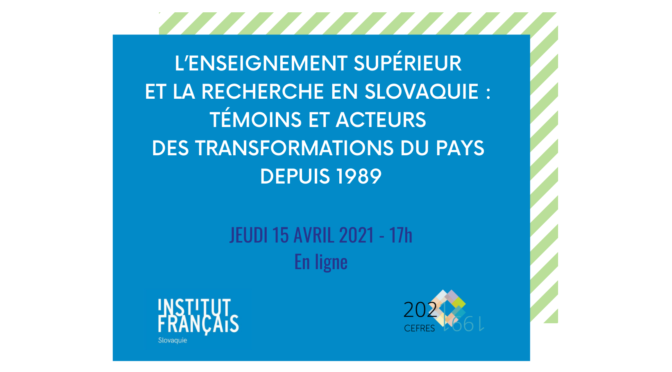
The French Institute of Slovakia and the French Centre for Research in Social Sciences (CEFRES) invite you to a round table during which we will focus on the world of higher education and research in Slovakia, particularly in the field of humanities and social sciences, as markers of the country’s history since 1989.
Date: April 15th, 2021 at 5 pm
Location: Online on Zoom (see link below)
Languages: SK-FR with simultaneous translation
Organizers: IFS, CEFRES
Registration: Google forms
With the participation of Christophe Léonzi, French Ambassador to Slovakia.
Moderator:
Jérôme Heurtaux, Director of CEFRES
Speakers:
- Etienne Boisserie, professor-researcher, Institut national des langues et civilisations orientales (INALCO) / co-director of the CREE (Europe-Asia Research Center)
- Adam Hudek, researcher, Institute of History, Slovak Academy of Sciences (SAV)
- Dagmar Kusa, professor-researcher, Bratislava International School for Liberal Arts (BISLA)
- Peter Terem, Vice-Rector for Science and Research, Matej Bel University (UMB)
The world of higher education and research has undergone many changes since 1989, as has the whole of Slovakia. The most salient of these are the end of the socialist bloc, the splitting of Czechoslovakia and the entry into the European Union. How has academic research and the world of ideas been impacted by the ordeal of communism and then by the hope born of the transition to democracy? What effect did Slovakia’s European integration have on Slovak higher education and research institutions, and on the content of research, while at the same time a process of liberalization and internationalization was taking place? More recently, the academic community has been impacted by other developments such as the growth and tertiarization of the economy, globalization and demands for more rule of law. Universities and research institutes have thus been both actors and witnesses of the changes in Slovakia during the last decades and the question of their autonomy and the freedom of researchers has been raised again in the spring of 2021.
In this round table, we will focus on the world of higher education and research, particularly in the humanities and social sciences, as markers of the country’s recent history. Partner of Slovak academics since its creation in 1991, the French Centre for Research in Social Sciences (CEFRES) celebrates its 30th anniversary in 2021. This is an ideal opportunity to analyze thirty years of Slovak research and international cooperation and to consider their future.
Please click on the link below to join the webinar:
https://zoom.us/j/94054349216 .
 Where: Filosofický ústav AV ČR, conference room (124a), Jilská 1, Prague 1.
Where: Filosofický ústav AV ČR, conference room (124a), Jilská 1, Prague 1.
Organizers: Centre for Science, Technology, and Society Studies (Institute of Philosophy AV ČR) & CEFRES.
Language: English.
The world we inhabit is characterized by conflicting and often incommensurable temporalities. Investigations of such tensions between and among various temporalities, how they interact and their specificities are now self-standing issues in contemporary social analysis. This half-day symposium aims to explore theoretical and methodological inquiries into the shifting character of social temporalities as they relate to the broader socio-economic and cultural change, including the overall dynamization of life and work. The two panels will focus on various perceptions of time, temporal tactics and ways in which diverse actors (institutions and individuals) negotiate and embody different temporal aspects of late modern social realities as well as on how social acceleration as such becomes perpetuated through various agentic strategies.
Program
10.30: Introduction & Opening
EXPLORING SOCIAL TEMPORALITIES
10.45 – 11.15: Immediacy, liveness, ceaselessness: foundations and consequences of the contemporary news environment – Marek Šebeš (PF JU)
11.15 – 11.45: Having no time in empty time: temporalities of the homeless – Petr Vašát (SOÚ AV ČR)
JUST HOW FAST IS ACCELERATED MODERNITY?
12.00 – 12.30: Coping with acceleration: triaging strategies and the new asceticism – Mark Carrigan (University of Warwick)
12.30 – 13.00: Fast modernity: ‘deflationary’ notes – Filip Vostal (FLÚ AV ČR & CEFRES)
13.00-13.30: Closing discussion
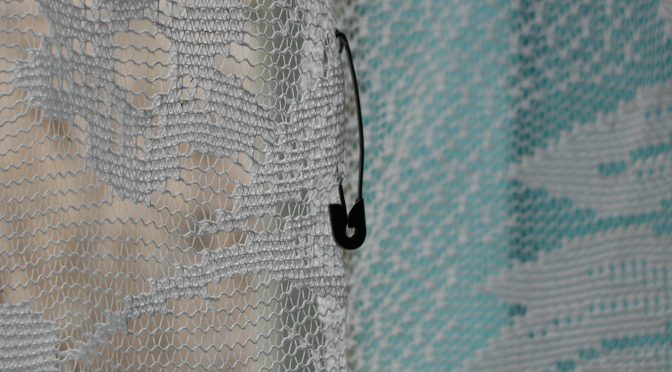
A workshop organized by the Institute of Ethnology of the Czech Academy of Sciences in cooperation with CEFRES
Time & Venue: 3-6 pm at CEFRES, Národní 18, 7th floor, conference room
Language: English
- Grégory Delaplace (Département d’Anthropologie, Paris Nanterre University): “The Thickness of Things Invisible”
- Luděk Brož (Institute of Ethnology – AV ČR): “Ghost and the Other”
Discussants:
- Martin Paleček (Language, Mind, Society Center at the University of Hradec Králové)
- Jonathan Mair (School of Anthropology & Conservation, University of Kent)

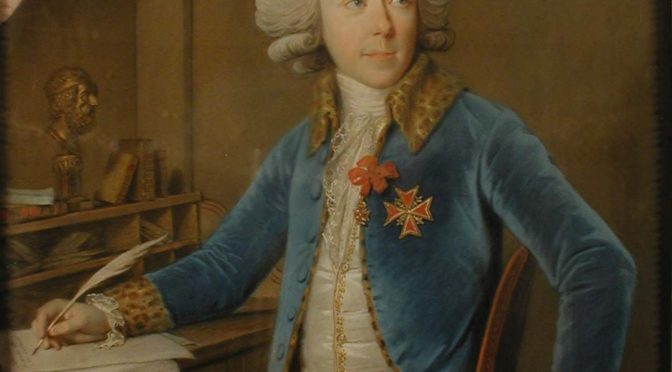
Claire Madl (CEFRES)
will be taking part at Franco-Czech historical seminar organized by CEFRES and Charles University
Date: Thursday March 25th , 9h-12h30
Where: CEFRES and online (see below)
Organisators: CEFRES and Charles University
Language: French
To visit the website and see the complete programme of the seminar, click here.
Click here to join the Zoom meeting : https://cesnet.zoom.us/j/96694269885
To register, please contact Jaroslav.svatek@ff.cuni.cz
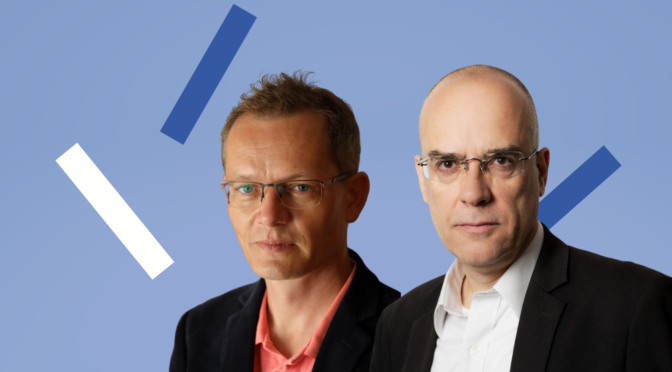
Mali or Bohemia ? “Grand Entetien” with François-Xavier Fauvelle and Ladislav Varadzin
Date : May 22, 2024 at 6:00 pm
Location : French Institute in Prague, Štěpánská 35, Prague 1
Language : french and czech (simultaneous translation)
Partners of the event : CEFRES, French Institute in Prague, Institute of Archaeology, Czech Academy of Sciences
François-Xavier Fauvelle and Ladislav Varadzin will discuss about Africa’s cultural diversity and various historical paths of african societies. The will think about characteristics of a “global” Middle Ages including Central Europe and several regions of Africa. Engaging the exercice (inevitably risky) of historical comparaison, they will share their thoughts about medieval written documentation (including arabic and jewish works) available for these two regions, the role of archaeology, the emergence of the State, meeting of Central European and African societies with Christianity or Islam, “broker” States and business and more. They will mention the kingdoms of Bohemia, Moravia, Ghana, Mali and Ethiopia.
François-Xavier Fauvelle is professor at the Collège de France, holder of the chair of history and archaeology of African worlds at the Collège de France and currently director of the French Research Center in Jerusalem. He worked in South Africa, in Ethiopia where he excavated the Christian site of Lalibela and discovered several Muslim towns, and in Morocco where he excavated the medieval city of Sijilmasa. Among some twenty books translated into a dozen languages, he is the author of Zlatý nosorožec : Příběhy o africkém středověku (Prague, 2021).
Ladislav Varadzin is a researcher in the Institute of Archaeology of the Czech Academy of Sciences in Prague. A specialist in recent prehistory and ancient history of societies in North-East Africa and Central Europe, he worked in Sudan and in Egypt, and he excavated the medevial site of Vyšehrad in Prague. He is the author of more than a hundred scientific articles and book chapters.
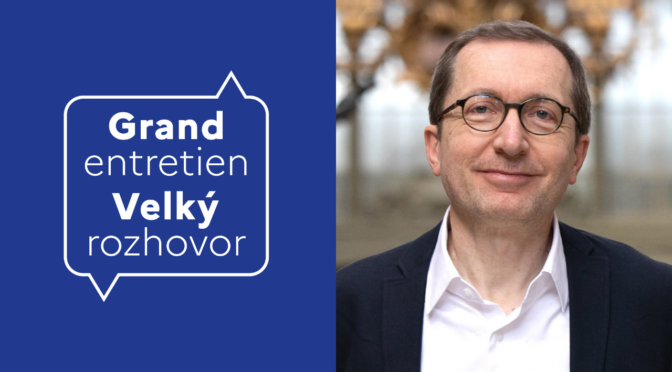
To Live in a Library of Five Dimensions
As part of the ‘Grands entretiens’ series, this event is organised by CEFRES and its Platform partner, Charles University, in collaboration with the French Institute in Prague.
Date: June 11, 2025, 18 h
Location: French Institute in Prague, Štěpánská 35, Praha 1
Language: in French with simultaneous translation into Czech
Moderation: Záviš Šuman, Faculty of Arts, Charles University
Where does the hostility towards literature come from, and what are the roots of its growing devaluation? How can we enrich our readings by taking a decentralised look at the texts? To what extent can a perspective from afar shed new light on our understanding of the Greek tragedies? And with what far-reaching arguments has Pope Francis put an end to a long history of scathing indictments of literary texts?
Continue reading Grand Entretien with William Marx →







